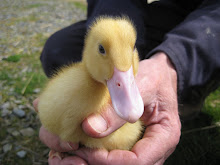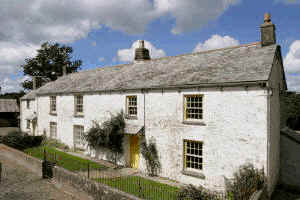
Yesterday was spent exploring parts of the local town of Okehampton that hadn't been peered at before: the
castle (a pleasure), the
station (a Miss Marple extravaganza of time stood stillness) and the
museum (a curate's/curator's egg).
Gagging for a cool drink as the station buffet is sadly closed on a Monday, we headed back into town, and nosed into one of the more salubrious looking cafes in
Red Lion Yard, mere strides from
the restaurant shamed in front of millions by Gordon Ramsay.
After half an hour in the
Panache Cafe (swiftly renamed Pan-ache by my disappointed companion), it became clear that the Gordon treatment should have extended here too.
Oh lordy, where to start?
Its position is great - a long frontage of big windows looking across the pedestrian alleyway; a busy busy thoroughfare but no cars, peaceful and perfect for peoplewatching. Decor slightly dull but clean and bright. In we hop. It's half full, but we sit for ten minutes or so before a waitress comes to the table and takes our order.
Meanwhile a chap with a Scandinavian accent comes in and asks if they do lunch. "No" is the response, "we only do quiches, pasties and cakes". He leaves with his family of four. I suggest that the next time someone asks that question in ooh, ten minutes time, it being lunchtime and all, that the response is "Yes, of course! We do a small range of great home made quiches and traditional pasties, which you can round off with a cream tea, or one of our fab cakes - do take a seat and I'll be over to take your order in two minutes." Better? More likely to end in tips? Yup.
As we wait, a chap comes in asking if he can have help to open the second of the double doors so his mate in a wheelchair can come in. Thereby follows a lot of flap and pathetic explanation that the door is really quite difficult to open and would man-in-wheelchair please put himself in the role of second-class-citizen and use the other door that no-one else has to use. That gets rid of two more potential customers.
Meanwhile, about six people have stopped to ask a passing waitress where the toilet is. It's quite clearly marked if you happen to have the one seat opposite, otherwise it's invisible. Suggestion number two - make up a two sided sign (write TOILET on it, obviously - both sides now, no skimping) and hang it at ninety degrees from the wall, so that everyone can see it without having to bother the staff or fret that they cannot see if that most essential room exists.
Next. Our cheese and onion pasties arrive with the comment that our drinks are not ready but she doesn't want our pasties to get cold. As I'd seen these plates sit on the counter for five minutes, not realising they were intended for us, I unhesitatingly hover my hand over the dishes. Steam? No. Heat? No. I pick them up and take them back to the counter and ask for them to be heated up. We hear panicky mutterings about how difficult it is to get a pastie to the right heat. They return, soggy from the microwave. Nil points. Served with a small handful of crisps. Zero points. Not a garnish of a lettuce leaf, a tomato or cucumber curl in sight. Somehow, I expected more in a cafe (even for my £2.45) than a soggy version of the pastie I could buy in
Endacotts bakery next door for half that. Charge an extra quid, but plate it up with style and a handful of lightly dressed salad, heat it in a proper oven (crispy is what you're after mates), and if you don't know how to heat a pastie may I suggest that you are in the wrong profession?
Drinks. Pot of tea and an elderflower cordial with sparkling water. For my £1.85 I expected a long cool drink - this is cordial we are talking about after all, not champagne. No, the glass is downed in one brief slug and I'm left entirely unrefreshed, even though a chunk of orange has been pointlessly attached to the rim and bangs against my not small nose.
As we roll our eyes at each other about this desperate lost business opportunity, and how sad it is that local people and tourists can't have access to a cheery cafe serving a simple range of really great food and intelligent service, an expensively dressed couple come in. They ask the lunch question and get the same answer, but they are alert and have noticed the blackboard signs announcing broccoli and cheese or tomato and basil quiches. "No, no," the waitress says, waving her hand about dismissively, we only have Quiche Lorraine left". The couple acquiesce, and take a seat. But when no-one has come to take their brief order in five or more minutes, they too walk out.
If ever a place was run for the benefit of the staff and not the customer, this is it. "No" is their favourite word. Excuses and explanations their bread and butter. When I get up to pay, the waitress asks if everything was alright. I take possession of their favourite word. "No", I say "I can't believe you aren't making the most of the opportunity here. The position is great, but the food is a disaster and you keep turning people away". Her jaw hangs open. Well, it's about time someone said something or at least four people are shortly going to be out of work. Okehampton deserves better than this. And so do I on my day out.
 Two years ago I moaned and fretted about the bizarrely polkadot affair that was my homegrown corn on the cob. How nature has improved itself.
Two years ago I moaned and fretted about the bizarrely polkadot affair that was my homegrown corn on the cob. How nature has improved itself.


























